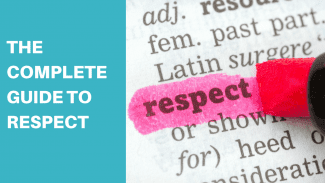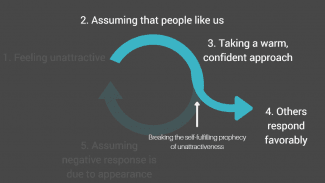“I’m tired of being treated like crap. Everyone takes advantage of me. However nice I am, no one ever gives me any respect. They just take whatever they can get and act like I don’t matter. How do I stop people treating me like a doormat?”
A doormat is someone who lets others treat them badly, doesn’t express their own needs, and doesn’t stand up for themselves.
If people often use you, take you for granted, or expect you to go along with whatever they want to do, this guide can help. We’ll look at why people treat you like a doormat and how to build more balanced, respectful relationships.
Signs you might be a doormat
- Feelings of resentment. When you keep sacrificing your time, energy, or values at your own expense, you may end up feeling tired and bitter.
- Staying in toxic relationships. Because you don’t believe that you deserve respectful friends and partners, you stay around and let toxic people treat you badly.
- People pleasing. You always put everyone else’s needs first.
- Changing your mind when someone disagrees with you. You may be so keen for approval that you express different opinions depending on who you’re with at the time.
- Doing favors for others without getting much (or anything) in return because you hope it will make people like you.
- Always being the one to reach out first to apologize after an argument.
- Being used as an unpaid therapist for people who don’t care about your life or problems.
Why people treat you like a doormat
If other people treat you badly, it may be because you have weak personal boundaries, don’t know how to say no, reward bad behavior, or have low self-esteem.
You might have problems standing up for yourself and saying “No” if:
- Your family didn’t show you how to set boundaries or limits in relationships. For example, they might have invaded your privacy by reading your diary.
- Your self-esteem is low, and you are so keen for other people to like you that you let them do whatever they want.
- You’ve been in abusive relationships and are no longer sure what is and isn’t reasonable in a relationship.
How to not be a doormat
You can’t force people to treat you well, but you can learn how to be assertive. An assertive person sticks up for themselves and speaks their mind while still being respectful of others. They are friendly but don’t allow anyone to take advantage of them, which means they are less likely to be treated like a doormat.
1. Improve your self-respect
Other people may be more likely to respect you if you respect yourself. Research shows that self-respect is positively linked to assertiveness.[1]
Here are some tips that might help:
- Take care of your physical and mental health. Get regular exercise, get enough sleep, and learn how to handle stress.
- Set meaningful, rewarding goals that give you a sense of accomplishment.
- Keep a record of your achievements and take pride in your skills.
- Work on getting rid of bad habits, such as excessive internet use or drinking too much. Self-improvement can lead to self-respect. Check out the Zenhabits guide to quitting bad habits for tips.
- Try to avoid making self-deprecating remarks about yourself.
- Set aside some time to think about your core values. Use them as an inner compass when you need to handle a difficult situation. This will help you develop core confidence and make better decisions.
2. Learn what a good relationship looks like
It can help to educate yourself about what healthy friendships, family relationships, and romantic relationships are like.
When you know what is and isn’t OK, you might feel more confident when it comes to setting boundaries.
In relationships, you always have the right to:
- Change your mind or preferences without feeling guilty
- Say no without being punished or made to feel bad
- Make mistakes
- Be treated with respect; no one has the right to bully or threaten anyone else
Here are a few useful resources on this topic:
- Love Is Respect has lots of helpful articles about healthy romantic relationships.
- If you are worried about your relationship with a family member, check out this article. Some tension between parents and their children is normal,[2] but you don’t have to put up with being bullied or disrespected by your family.
- If you aren’t sure whether a friend is treating you badly, look at our list of signs that point to a toxic friendship.
3. Think about your personal boundaries
You can think of boundaries as fences or “hard lines” in a relationship. They set out what you will and won’t tolerate from others. People with strong boundaries are less likely to be used. Psychcentral has a good introductory guide to boundaries in relationships and why they are so important.
For example, you might have a firm boundary when it comes to lending people money. Your boundary might be, “I don’t make loans to anyone.” As long as you stick to your boundary, no one can take advantage of you financially by asking for money and then never paying it back.
Your boundaries may change depending on the situation. For example, you may be happy to look after your sister’s cat when she’s away for a weekend, but draw the line at taking the cat into your home for a week. As long as you communicate your boundaries clearly, it’s OK if they change.
When someone asks you to do something that makes you feel uncomfortable, ask yourself, “Does this cross one of my boundaries?” This can help you decide what to do next. If the answer is “Yes,” you need to enforce that boundary. This usually means saying “No” or asking them to change their behavior.
4. Practice saying “No”
Saying No is a key skill that allows you to keep your boundaries in place.
You may have heard this saying: “The word ‘no’ is a complete sentence.” It’s true that you have the right to say no without giving an explanation. But in reality, it often feels too awkward to just say no and nothing else.
Here are some tips that may make it easier:
Don’t give elaborate reasons or explanations
For example, let’s say someone asks you to babysit their children on Friday night. You don’t enjoy childcare. One of your boundaries is “I don’t look after other peoples’ kids.”
You might be tempted to make an excuse like, “No thank you, I said I’d visit my sick mother on Friday.”
The problem with excuses is that they don’t always shut the conversation down. In this case, the other person might say, “Oh OK, can you babysit my kids on Saturday instead then?” It’s better to give a short, polite, but final response that makes your boundary clear. For example, you could say, “Sorry, I don’t do babysitting!” with a pleasant smile.
Offer the other person alternative suggestions
If you truly want to help someone out but can’t do it yourself, point them towards a better solution. Only do this if it won’t inconvenience or annoy another person.
For example:
“No, I can’t help you with that report right now. Sally told me yesterday she’s having a quiet week though. Perhaps she could help you?”
Give yourself time to think before replying
If you aren’t sure how to answer someone’s question, try to avoid committing yourself immediately.
For example:
- “I’m not sure I can do that. I’ll get back to you by 6 p.m.”
- “I don’t know if I’m free to help you on Friday, but I’ll let you know tomorrow.”
Use the broken record technique
If someone keeps repeating the same unreasonable request, repeat your response using exactly the same words and in the same tone of voice. After a few attempts, they will probably give up.
Ask for guidance
Sometimes we have no choice but to go along with a request. But asking for advice or instructions can make the task more manageable. Instead of a straight “No,” we can subtly ask the other person to change their requirements.
For example, suppose your boss asks you to take on too many tasks at work. They want you to complete everything in 3 days, but you know their request is unrealistic.
If you’re a doormat, you might try to get everything done and risk burning yourself out. An assertive alternative would be to say, “I can do these 5 tasks, but it’ll take a week to get them all done, not 3 days. What would you like me to prioritize?”
5. Ask directly for better treatment
Saying “No” to unreasonable requests is a great start when you’re learning to stand up for yourself. The next step is to learn how to ask someone to change their behavior when they mistreat you.
When you need someone to act differently, tell them:
- How you feel
- When you feel that way
- What you’d like to change
For example:
[To a boyfriend or girlfriend]: “I’ve realized I always pay the bill when we’re on dates. That makes me feel taken for granted. From now on, I’d like us to take it in turns to pay.”
[To your boss or manager]: “When you ask me to stay late in the office on a Friday night without giving me much warning, I feel like I’m being asked to do more than everyone else. I’d like to talk about how we can manage my schedule and tasks so I don’t have to stay late.”
6. Be clear about consequences
If you’ve tried asking someone to change their behavior and they continue to overstep your boundaries, you don’t have to give them another chance. It’s up to you to decide whether to forgive them and keep the relationship going.
If you do want to give someone a second chance, it can help to spell out what you will do the next time they behave badly. Only do this if you’re willing to follow through. If you go back on your word, the other person will decide they don’t need to take you seriously.
For example:
- “If you make another mean joke about me, I’ll end this conversation and hang up the phone.”
- “If you get another speeding ticket, I won’t lend you my car again.”
- “If you don’t put your dirty clothes in the laundry basket instead of dropping them on the floor, I won’t wash them.”
7. Use assertive nonverbal communication
Assertive body language can make you appear and feel more confident. When you need to set or enforce a boundary, remember:[3]
- Do not fidget
- Stand or sit upright with good posture
- Make eye contact
- Keep a sincere facial expression. Avoid frowning or grinning.
- Stay a reasonable distance away from the other person. Don’t lean in too close or lean away.
- If you make gestures, don’t point because this can come off as aggressive.
8. Look at peoples’ actions, not their words
Focus on what people actually do, not just what they say. No matter how convincing they might sound, nice words don’t mean anything unless they’re accompanied by respectful behavior.
For example, someone might take advantage of you but say things like:
- “We’ve been friends for years! How could you even think I’m using you?”
- “I’m your wife/husband/partner, I’d never take advantage of you.”
When you start looking out for any mismatch between what someone says and what they do, it’s easier to tell when it’s time to be firmer with your boundaries. If it’s a chronic problem, it may be time to end the relationship.
If someone often does or says things they later deny, and you feel like you’re going crazy, this is a sign of gaslighting, which is emotional abuse. If this sounds familiar, check out Healthline’s article about dealing with gaslighting.
9. Know you don’t have to save every relationship
Some friendships and romantic relationships just don’t work out, and that’s OK. Most people don’t settle down with the first boyfriend or girlfriend they ever have. Very few friendships last a lifetime. Do not make yourself into a doormat for the sake of keeping a relationship going.
If someone keeps ignoring your boundaries or mistreating you, ending the relationship might be the best option. It doesn’t mean you’ve failed or that you aren’t a nice person. It just means that it’s time to move on to people who will treat you better. Focus on meeting like-minded people and try to build friendships on shared interests and values.
10. Be ready for pushback
When you start setting boundaries in your relationships, be prepared for some resistance. If someone is used to you saying “Yes” or going along with what they want all the time, they may be surprised or annoyed when you start acting less agreeable. Be consistent. In time, most people will learn to adapt.
If you don’t feel safe enough to talk about boundaries and stand up for yourself, you might be in an abusive relationship. In this case, your first priority is to stay safe. See this guide for more advice about identifying and leaving abusive situations.











Nice article.thank u vry mch
This was amazing! And I saved several other articles i seen here that sadly I relate to, but I’m excited to read them! It’s so nice to know some people do understand!
Correction my podcast is JustMsRose not miss rose thanks
Nice, i’m so done with the doormat character. Thanks Viktor
Wonderful article. So many helpful suggestions. Put so well. Not putting up with it any longer does not mean you are not a nice person.